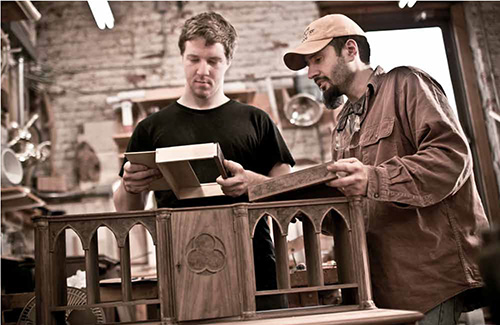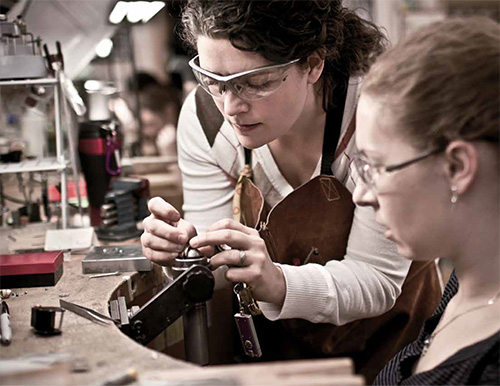North Bennet Street School: training the American Craftsmen of tomorrow.
Miguel Gómez-Ibáñez has been called “an evangelist” for his cause: preaching the value of teaching hand skills. That’s partly because the institution of which he is president, the North Bennet Street School, has been teaching manual labor skills for more than a century to people who turn that into honest work. But it’s also because he believes the benefits of learning carpentry or bookbinding or violin making extend beyond the practical.
“There is a perception that high-tech training programs are relevant and responsive to the needs of society but not manual training skills,” he says. “But there is a growing consensus that training in hand skills is relevant to conceptual skills.
“When you become involved in the creative work of making useful, beautiful objects and gain a personal understanding of what is meant by the intelligence of the hands, it transforms who you are and how you think.”
Those skills are taught in eight areas of concentration at the school: carpentry, locksmithing, cabinet and furniture making, bookbinding, jewelry making and repair, violin making and repair, piano technology, and preservation carpentry. It continues a tradition going back to 1885, when the school was founded to help North End immigrants gain the skills needed to find employment in America. Through the years the school has transformed to meet the needs of its community, expanding into social services and other vocational training.
Today the school trains 150 full-time students (there are part-time programs, too) to be serious craftsmen and women, championing and passing along a love of traditional American craftsmanship. A small majority of the students, who range in age from eighteen to sixty, usually come from Massachusetts, but many come from outside the Northeast, some even from overseas. Their unifying characteristic is that they do not look at the craft as a hobby—it’s serious work for those who have shown the ability or the talent to learn hand skills at the highest level. (Most students stay well past school hours, as they cut and bind and shave and polish well into the evening.)
After moving the carpentry programs off campus about eight years ago, the school’s focus now is bringing everyone under one roof as renovation continues on a new site for the campus—a printing plant near the original school.
What will not change is the “sloyd” approach the school takes toward instruction (a Swedish system of manual training that means “hand skills” or “craftsmanship”).The school today continues the tradition of believing hand-skills training is integral to one’s mental and physical development. “It’s what makes the school so special,” says Nancy Jenner, the school’s
director of communications. “We’re teaching craftsmanship at the highest level, but we’re really teaching so much more.”



